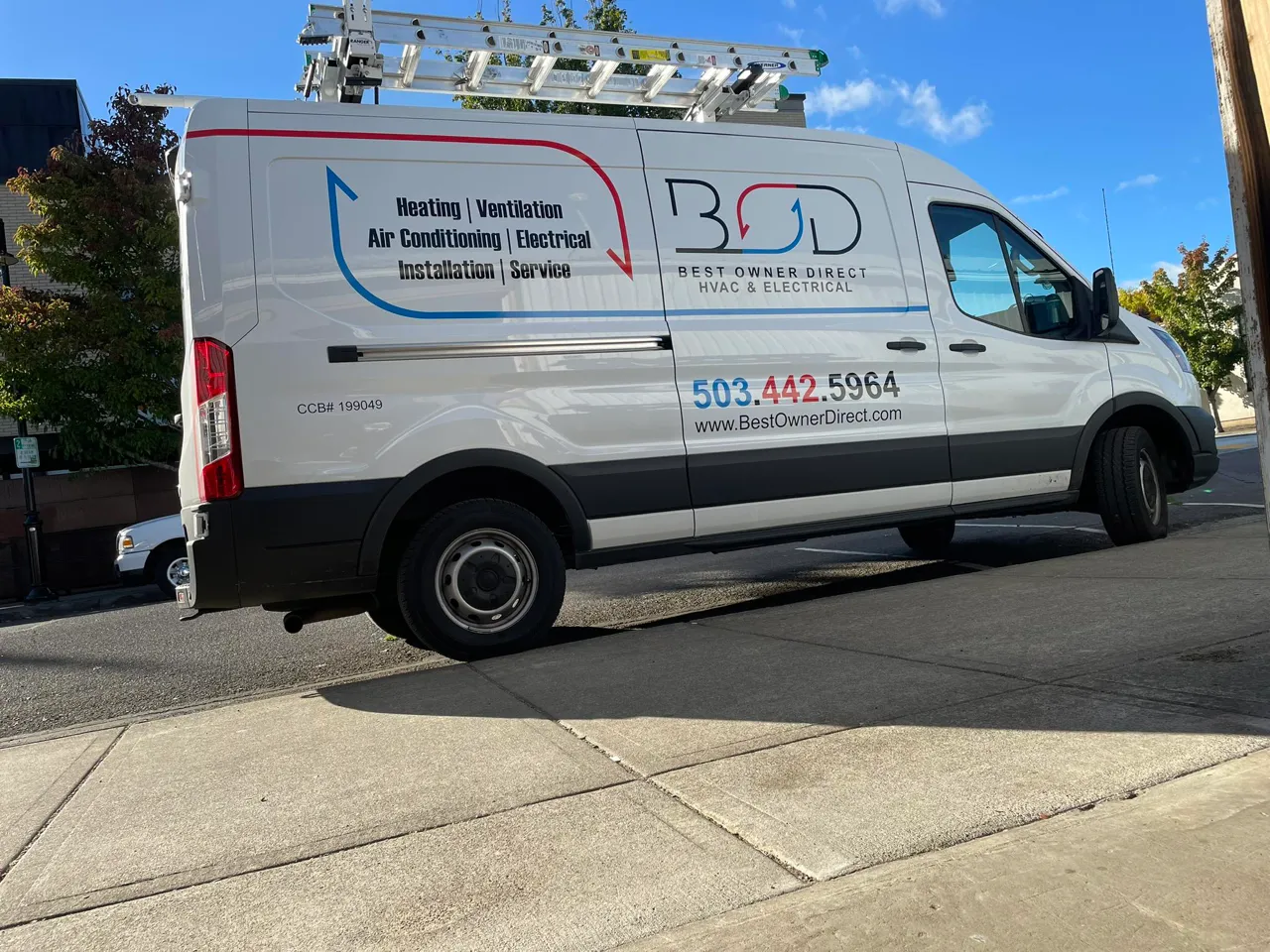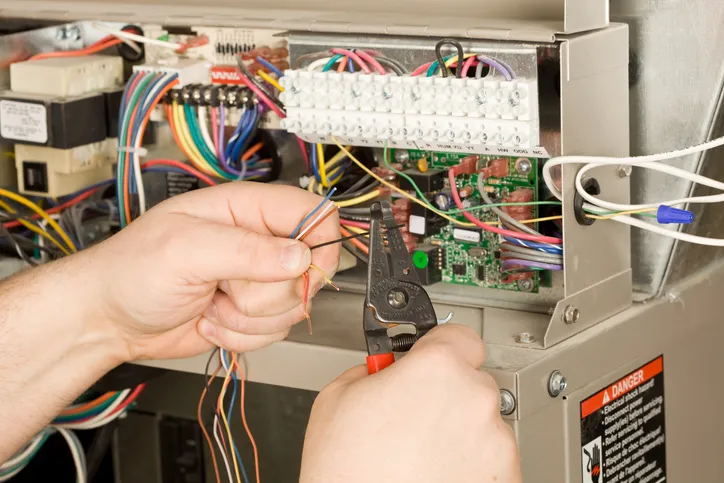Menu
Furnace Tune Up in Newberg, OR
Stay warm with a furnace tune up in Newberg, OR by Best Owner Direct HVAC & Electrical. Seasonal care prevents breakdowns and lowers costs. Schedule now.

A dependable furnace is essential for comfort during Newberg’s damp and chilly winters, and the best way to keep it performing at its peak is with a professional tune-up. At Best Owner Direct HVAC & Electrical, we deliver comprehensive furnace tune-up services designed to maximize efficiency, extend equipment life, and ensure safe operation. By catching small issues before they become costly repairs, we help you avoid unexpected breakdowns, reduce energy bills, and protect your family from risks like carbon monoxide leaks. Our tune-ups are tailored to the unique climate and air quality conditions of the Willamette Valley, giving homeowners peace of mind all season long.
Common Furnace Problems in Newberg Homes
- Rust and corrosion on components from persistent humidity and coastal-influenced air.
- Dirty burners or clogged filters that reduce heat output and raise energy use.
- Cracked or deteriorated heat exchangers from years of thermal stress.
- Ignition failures or intermittent pilot/ignitor problems after long off-seasons.
- Poor airflow caused by blocked vents or dirty ductwork, made worse by seasonal pollen and wildfire smoke.
- Thermostat or control board malfunctions that cause short-cycling or uneven heating.
Understanding these typical issues helps explain why a thorough furnace tune up in Newberg OR focuses on inspection, cleaning, and safety verification rather than only simple cleaning.

What a Furnace Tune Up in Newberg, OR Includes
A comprehensive furnace tune up covers both performance and safety checks. Key elements include:
- Visual inspection of the heat exchanger and burners to detect cracks, corrosion, or improper flame patterns. A damaged heat exchanger poses serious safety risks.
- Cleaning of burners, flame sensors, and combustion chamber to restore proper combustion and reduce the chance of misfires.
- Safety and carbon monoxide checks, including monitoring for CO presence and confirming venting integrity.
- Combustion analysis and efficiency optimization, adjusting fuel-air mixture and ensuring proper draft for the most efficient operation.
- Electrical component inspection: relays, capacitors, control boards, wiring, and connections are tested for wear and safe operation.
- Airflow and filter assessment, checking blower motor, belts, and filter condition; recommending replacement or duct cleaning if needed.
- Thermostat calibration and system cycling tests to confirm consistent temperature control and eliminate short-cycling.
- Detailed report with recommendations, noting repairs, parts that may need replacement soon, and whether replacement is advisable given age and condition.
Each step is performed with an eye toward Newberg homes, where damp conditions can hide corrosion and where air quality issues may place extra stress on filters and ducts.
Diagnostic Process: What to Expect During the Tune Up
- Initial system history and visual inspection to note age, previous repairs, and visible problems.
- Filter and airflow check; change or advise on filter replacement if heavily soiled.
- Burner and ignition inspection plus cleaning for reliable starts.
- Heat exchanger check using visual inspection and instrument readings to detect leaks or cracks.
- Combustion efficiency test and CO measurement to confirm safe, efficient operation.
- Electrical and safety control tests, including limit switches and fan controls.
- Venting and flue inspection to ensure no blockages or back-drafting.
- Final calibration of controls and thermostat and a short operational run to verify performance.
A full tune up usually takes an experienced technician between one and two hours depending on system condition and any diagnostic needs.
Safety and Carbon Monoxide: Why Checks Matter in Newberg
Carbon monoxide is odorless and potentially lethal. Furnaces that are aging, corroded, or improperly vented are the primary household source of CO. In Newberg’s moist climate, metal parts can corrode faster, increasing the risk of cracks in the heat exchanger or compromised venting. A tune up includes direct CO testing, vent integrity checks, and verification that combustion gases exit the home properly. These safety checks protect your family and are a key reason an annual furnace tune up is essential.
Efficiency Optimization and Homeowner Benefits
A properly tuned furnace runs more efficiently, which means:
- More consistent comfort with fewer cold spots.
- Lower energy bills due to improved combustion and proper blower performance.
- Reduced likelihood of mid-winter failures and the inconvenience and cost of emergency repairs.
- Extended equipment life when small issues are corrected before they escalate.
In Oregon, efficiency improvements also help reduce carbon footprint and may improve eligibility for local utility rebate or incentive programs when replacements are needed.
When a Tune Up Reveals Problems: Repair vs. Replacement Guidance
A tune up may uncover items that need repair or indicate that replacement is the more cost-effective long-term choice. Consider replacement when:
- The heat exchanger is cracked or compromised.
- The furnace is older than 12 to 15 years and requires frequent costly repairs.
- Efficiency is significantly below modern equipment and the unit is driving up energy bills.
Repair is usually appropriate for components like ignitors, sensors, belts, and motors when the rest of the system is in good shape. A professional tune up provides the facts you need to make an informed decision about repair or replacement.
Timing and Maintenance Schedule for Newberg Homeowners
- Schedule a professional furnace tune up once per year, ideally in early fall before the heating season.
- Replace disposable filters monthly during heavy-use periods and inspect reusable filters on the same schedule.
- If your home has experienced wildfire smoke or heavy pollen, schedule air quality and duct inspections in addition to the furnace tune up.
- Keep maintenance records and any service reports to preserve warranty coverage and inform future assessments.
Frequently Asked Questions
Q. How long does a tune up take?
A. Usually 1 to 2 hours, depending on system complexity.
Q. Will a tune up interrupt my heating?
A. Any interruption is brief; technicians work efficiently to restore normal operation before leaving.
Q. Does routine maintenance void warranties?
A. No. Most manufacturers require routine maintenance to keep warranties valid; keep records of annual service.
Protect Your Comfort and Safety This Season: Book Today
A professional furnace tune up in Newberg, OR, from Best Owner Direct HVAC & Electrical delivers safety, reliability, and improved efficiency tailored to local climate and air quality challenges. Regular maintenance protects your investment, reduces surprises during cold weather, and ensures your home stays warm and safe throughout the season. Schedule yours today.


